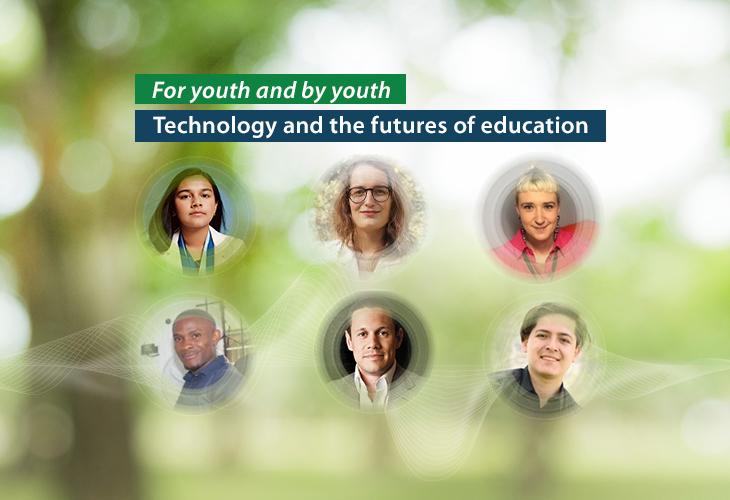Young innovators and entrepreneurs call for human-centered technologies in education

Young innovators and entrepreneurs call for human-centered technologies in education
Young innovators and entrepreneurs explored key questions on technology and the futures of education during the second webinar of a youth series co-organized by UNESCO and the United Nations Office of the Secretary-General’s Envoy on Youth. The panelists were joined by 15-year-old scientist Gitanjali Rao, as well as by Badr Jafar from the International Commission on the Futures of Education, who offered some reflections and connections to the work of the Commission.
Hopes and fears about the uses of technology for educational purposes
Looking through a lens of hope, Svenia Busson, Founder of LearnSpace and Edtech Tours and author of ‘Exploring the Future of Education’, imagined a future where technology is embedded in all places and spaces of learning while remaining almost invisible. Her idea was supported by Jide King, who also described a future where people come together through various technologies that facilitate the seamless exchange of ideas, thereby enabling more open and inclusive education systems, all while placing the human at the center. Yet, the panelists also expressed concerns about the uses of technologies for educational purposes. Alice Wroe, Augmented and Virtual Realities lead at the Atlantic Institute and Founder of Herstory UK, noted that advances in technology and the arrival of augmented and virtual realities can on one hand can allow students to have experiences otherwise unattainable, but may push governments to slow down on achieving universal enrolment as physical attendance in schools becomes less important. Finally, Lester Vargas, Co-founder of FractalUp and Young Leader for the SDGs from the 2020 class, expressed concerns about the tension between the need for better data to improve educational technologies, and the implications this has on learner privacy.
Collective action for a human-centered digital education
In reacting to the youth perspectives, Badr Jafar emphasized the importance of thinking outside of our comfort zones to envision possible futures, and building locally led but globally adaptable systems based on multi-sector and multistakeholder dialogue. He stressed that to attain these hopeful visions by youth, the collective, intellectual and material contributions of the private sector, governments and civil society must be utilized without being over-reliant on any one of them. He highlighted the importance of educators who can balance asynchronous and synchronous methods, policymakers who are keen to bridge the digital divide, employers who understand the value of diversity and inclusion and lifelong learning, and families and communities serious about the need to equip our children with the resilience and flexibility to face this daunting but exciting future.
Tapping into the potential of technology to shape innovation and access to education
During her keynote speech, Gitanjali Rao pointed to newer technologies like 5G, nanotechnology and artificial intelligence that are shaping our future and creating opportunities for innovation. Such technologies can offer solutions that were inconceivable just one generation ago, necessitating a rethinking of how we teach and learn. However, she reminds us that there are still 258 million children and youth who are out of school, highlighting the potential to leverage technology to address this stagnating problem and also promote innovation. She shared an example of innovation workshops in underserved areas which teach students to identify problems, ideate and build their own solutions.
that education can be delivered to quite literally anybody
who wants it, but more importantly to anybody who needs it
-Gitanjali Rao
COVID-19 has also pushed innovation in education, but there is still much to be done to deliver a virtual education that is as robust as the physical school. Even if technology permits, Gitanjali Rao reminds us that internet access for all, availability of free or inexpensive resources or collaboration tools and qualified teachers are non-negotiable to achieve universal quality education for all. In his reactions, Badr Jafar recalls the ideas expressed by the Commission to make free and open source technologies available to teachers and students and to ensure that open educational resources and open access digital tools are supported. He added that as part of a collective effort, businesses should think of themselves as providers and partners of good education.
Technology for improved, personalized and human learning experiences
The panellists expanded on their views for positively implementing technology into learning. Lester Vargas expressed faith in hard data and the objective decision-making power of machines. In his perspective, proper technology benefits individuals through personalized learning, and schools, universities and employers should start putting more emphasis on skills rather than degrees. Svenia Busson talked about the ways technology can help untether education from schools as a physical location and move it to other more educative but still real environments. Jide emphasized teaching in bite-sized chunks and discussed the ways technology can help people drive their own learning, through social and community exchange that is guided not only by schools and teachers, but also by the demands of the labour market. Finally, Alice Wroe mentioned the idea that technology can best advance or strengthen learning when it “lifts us into different conceptual planes to experience education,” and stressed the importance of having teachers and educators at the center of the discourse. She also noted that empathy, training, co-presence and being active rather than passive participants are all crucial to being more human when we are digital. The four panellists left the discussion with a vision of technology in education that shifts the focus from the individual to the collective, that considers local contexts, that leverages existing opportunities and tackles challenges to build the impossible.
The discussion at this webinar will inform work of the International Commission and the report forthcoming in November 2021. If you would like to learn more about this discussion, we invite you to watch the recording of the event, available here (in English, French and Spanish).